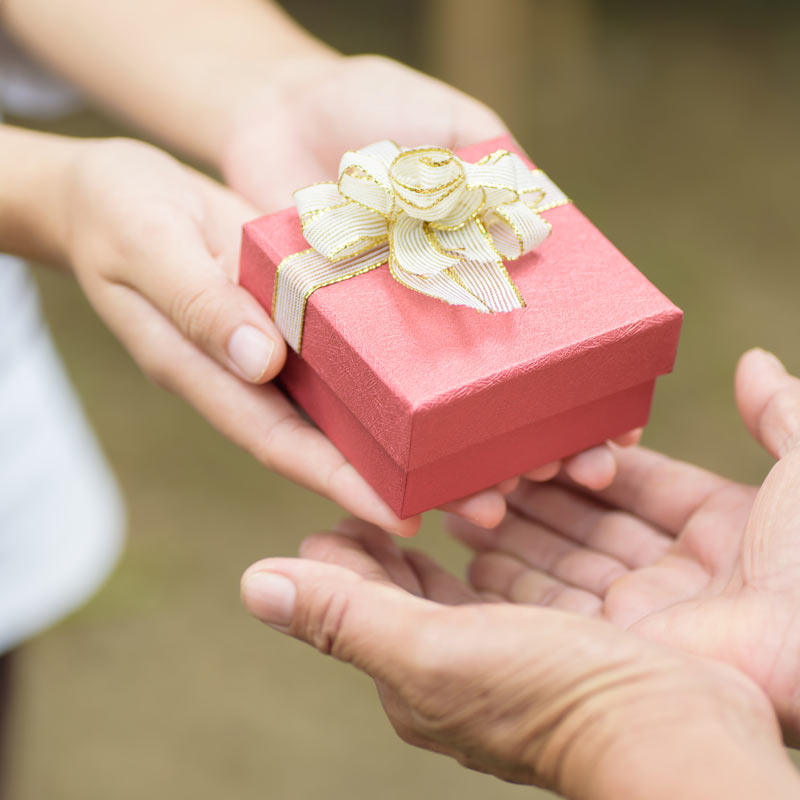When I worked for a large Japanese company, anyone who had traveled from Japan, usually managers and directors, nearly always brought back gifts for their co-workers and subordinates.
Sometimes we were given sweets or savoury snacks, the likes of which we had never seen before, or sometimes we received really beautiful items such as fans, tins of tea, stationery or small ceramics.
It was so exciting to receive these gifts and they were always treasured. I have many of them still and they serve as fond mementos of those days.
This is also how I originally learned about the Japanese custom of giving small gifts as a way of showing appreciation to your staff and colleagues.
What is this custom of giving out gifts?
Of course, it’s not only your workmates that have the honour of receiving such lovely objects.
The custom of giving gifts in Japan is deeply rooted in Japanese culture where it is important to show respect and consideration for family, friends, your customers and colleagues. It’s also a way of thanking someone who has helped you, shown kindness or given you support in some way. The value or size of the present is somewhat secondary to the ‘ceremony’, presentation and thought that goes in to proffering a gift. Receiving the gift humbly and graciously (maybe even refusing it at first) is just as important!
In the business world, it’s common to present clients with expensive corporate gifts whereas colleagues are more likely to receive smaller novelties or souvenirs. When meeting for the first time it’s traditional (and possibly expected depending on how formal the company culture is) for both sides to exchange gifts at the end of a meeting. And it can be embarrassing if one side is unaware of the custom and has to receive an expensive item with nothing to reciprocate.

In more social settings, as you would expect gifts are given for weddings, births and other special celebrations such as graduation or childhood milestones; and today Japanese people have adopted the tradition of giving presents on birthdays and at Christmas.
You might also take a gift when you visit someone’s home or get together with someone you haven’t seen in a while.
When I travel to Japan, although it is nice to have some small gifts to give to friends or first-time acquaintances, I have found that most Japanese people are very kind and understand that it’s not always possible to travel with a lot of ready-wrapped presents from your home country. In informal circumstance, people still like to present you with some pretty souvenir, often a speciality from their home town, to show friendship and make you feel welcome in Japan without being too bothered if you don’t have anything to offer in return.
Why is gift giving traditional in Japan?
In the West, we tend to only give presents to those we love or are close to. In Japan however, although gifts are given to family members and close friends, they are also used to show appreciation, respect and a wish to strengthen or maintain a relationship, whether that’s as a colleague, client or mentor.
The custom of bringing back souvenirs when you’ve been traveling is also common and this has its origins in Edo period pilgrims who visited temples and holy sites, bringing back trinkets, charms and souvenirs for those that were not able to travel.
The idea that these religious souvenirs will bring good luck to the recipient is still encompassed in the gift-giving custom and superstition says that giving things in pairs is lucky. Three and eight are also lucky numbers but never go for four which is a very unlucky number in Japan because one pronunciation sounds similar to the Japanese word for death. Similarly, green is good either for the gift itself or in the wrapping but avoid red since it can be associated with funerals (although in other circumstances red is an auspicious and joyous colour – maybe a little too strong for gift giving).
Because it’s so common to take a gift with you it’s easy to find suitable gift items in Japanese shops. They seem to specialize in beautifully presented, decorative objects often in a presentation box, that any one would be delighted to receive and they are usually happy to gift wrap it for you, taking all the stress out of finding suitable items for colleagues and acquaintances. If you don’t want to pay extra for gift wrap however, often even the bag from the shop where you bought it is good enough quality and pretty enough to present your gift.
How to give and receive a gift in Japan
The way that present giving is regarded in Japan is what we might call ‘mindful’. It’s important that the outer wrapping looks beautiful, well presented and as if at least some thought has gone in to choosing and preparing the gift (something I think we could all learn from).

The present should be offered politely with both hands and given discreetly, not in front of a large group. Showiness is not really done in Japan and sometimes someone might say ‘tsumaranai mono desu ga…’ meaning ‘here’s just a boring thing I got for you…’ while they hand it over. This sounds quite cute and amusing to our ears, but don’t make a big hoo-ha about receiving the gift as you will just embarrass the giver.
Of course, you should receive any gifts humbly and traditionally you should refuse it at least twice before accepting it, taking care not to appear rude or flippant.
Receive the gift with both hands and don’t forget to say thank you! It’s not polite to open the gift in front of a group of people so you can save it for later.
When you receive a gift from someone in your peer group, for example a co-worker or someone of a similar age, it’s considered polite to send a thank you letter or even something small in return.
The language of giving
The ceremony or formalities around giving gifts in Japan is interestingly reflected in Japanese language.
As well as the very modest phrase ‘tsumaranai mono desu ga’, there are other clues in the language about the significance of gift giving.
There are two verbs meaning ‘to give’ in Japanese: 'ageru' and 'kureru'. The difference is subtle and distinguishes the difference between giving a gift to someone and humbly receiving a gift.
If you wanted to say ‘I gave my friend a gift’ you would use ‘ageru’ but if you want to tell someone ‘My friend gave me a gift’ you should use ‘kureru’ which is more polite and shows your gratitude.
Many people know how to say ‘thank you’ in Japanese but please don’t use a casual ‘domo’ to thank the giver of a gift. You can use the more formal ‘arigatou gozaimasu’ or (even more formal) ‘domo arigatou gozaimasu’ to really show your appreciation.
Language is very interesting in this way as it tells you about the culture that it comes from and, conversely, knowing a little about the culture can also help you learn the language!
- More about Japanese gifts: Japanese furoshiki - it’s a wrap!
- More about Japanese gifts: Small gifts with big meaning
- Shop for Japanese gift ideas



